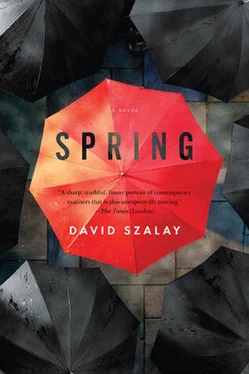‘You’re too smart to work in a hotel lobby,’ he said. He was propped on his side, peering at her in the imperfect darkness of the London night.
‘I know,’ she said, and then laughed— Ha! — at her own immodesty.
‘Of course you are,’ he said. ‘So why do you? You went to university?’
She nodded.
‘Which?’
She told him.
It made him laugh. ‘Jesus!’ His smile shone. ‘That’s quite intimidating!’
‘Is it?’
‘So why do you work in a hotel?’ he said.
She said she wanted to set up a small hotel, somewhere near the sea, and she needed some experience of hotel management. That was why.
‘That’s very sensible,’ he said. ‘Most people would just get on a plane somewhere and fuck it up.’
‘I know,’ she said. This time she did not laugh.
‘How long have you been working there, in the hotel?’
‘A few months.’
‘What did you do before?’
‘I worked in publishing…’
She had taken his flopping penis idly in her hand—or it seemed that she took it idly. In fact, she felt quite self-conscious, and she just held it as in slow pulses it started to stiffen. ‘I worked in publishing,’ she said. He seemed to have no further questions. Still feeling quite self-conscious, she moved on the mattress until her flaxen hair spilled onto his furry stomach.
Some time during the night, when she went to the loo, she opened the fridge in the tiny kitchen. It was entirely empty—not even milk. It had the pristine white look of a display fridge in a department store. It was then that she noticed there were no covers on the duvet or the pillows. In the morning, while he showered, she started to wonder about these things. The flat had a totally unlived-in feel. It seemed to be very new. In the living room there was nothing but the sofa, still in its plastic wrapping, and a TV—its packaging too was still there. The kitchen was equipped with two mugs, one plate, one knife and one spoon. The oven had never been used—it still had pieces of polystyrene and an instruction manual in it. The expanse of built-in storage space in the bedroom was empty. She was looking into this surprising void when he put his arms around her waist and picking her up, spun her once, twice—she squealed, her legs kicked and flailed—and fell with her onto the bed.
‘Why isn’t there anything here?’ she said.
‘What do you mean?’
‘I mean those cupboards are empty. There’s nothing there. Don’t you have any clothes?’
‘Clothes? What do I need clothes for?’
‘And there’s nothing in the kitchen. Not even a kettle.’
‘I’ve just moved in,’ he said, more seriously. ‘That’s obvious, isn’t it?’
‘Where are all your clothes then?’
‘They’re somewhere else. I’m moving my stuff here next week. What’s the matter?’
She did not press him.
Instead, she went and had a shower. There was only one towel and it was already quite wet. While she was using it, and looking at herself in the steamy mirror, he shouted through the door, ‘Do you want to go out for breakfast, or do you want me to go get some stuff?’
‘Go out!’ she shouted back. She brushed her teeth with his toothbrush, and daubed some of his deodorant under her arms.
He was smoking a Silk Cut in the kitchen with the little window open, using the sink as an ashtray. ‘Okay?’ he said, smiling.
As they went down in the tiny lift—the flat was quite high up, had a view over the huge normality of south London—she surprised herself again. She said, ‘I’m in love with you.’
* * *
The past. As if someone had forgotten to lock its cage and it had slipped out, looking for her. It is on the loose now. It is at large in the lobby. It is there with the multilingual louche flâneurs who populate it at this hour of the day. Half past four, p.m. She stands there next to an enormous vase of flowers, staring out at the public luxury.
For a while, months, they met in the flat in Battersea. It soon emerged that he was not in fact separated from his wife—not physically, though he insisted they were ‘emotionally separated’, that when he had told her he lived on his own, it was in a metaphorical sense true. He said he hated his wife. (And she was shocked by his use of that word—she had never hated anyone.) In a strictly literal sense, however, they did still live together, with their two daughters—and for their two daughters—in the house in Sevenoaks. The flat in London was a pied-a-terre, that was all. He was often on jobs—‘stake-outs’—that made it impractical for him to trek all the way to Kent every night. The ‘Jane Green’ job had been such a ‘stake-out’. Mostly they were neither so interesting nor so profitable. Typically they involved loitering outside a fashionable nightclub in Mayfair, hoping to snap a Premier League footballer or someone from TV, or if you were very lucky one of the junior Windsors. Or spending days at Heathrow like a stranded traveller, eating junk food and eyeing up incoming flights from JFK and LAX. That was the sort of thing he mostly did. He said he hated that too. He hated his life, he said—how it had turned out. ‘How did it happen like this? I didn’t want it.’ He meant the marriage, the job. (On the plus side, he did make a lot of money. For the ‘Jane Green’ pictures alone, he eventually told her, he was paid £50,000.) He said, as they lay naked on the mattress in the still unfurnished flat, that he wanted to change everything. He just needed some more time. Then he would leave his wife in Sevenoaks and live with her in London; he would stop papping and start Ansel-Adamsing. Then they would travel together to the wild, pure places he told her about. Then everything would start anew.
She lived for the two nights a week she spent in the flat in Battersea, and the occasional minibreak—there were minibreaks, there were weekends away. When they met in London she would wait in the flat. She had her own key. She would wait in the kitchen smoking, or in the living room with the TV on. He was usually late. It might be midnight, one o’clock. Then he showed up smelling of the kebab he had eaten, sometimes flushed with success. He opened a bottle of wine and she listened while he told her about his evening’s adventures. Then they had sex. The next day, at lunchtime, he took the train to Sevenoaks. It wasn’t always exactly like that. Sometimes he didn’t have a job to do and they would spend the whole evening together.
Finally, on New Year’s Day, she told him she would never see him again unless he left his wife. ‘What are you talking about?’ he said. He was in a windowless hotel bathroom in Florida (a family holiday), whispering into his phone while the extractor fan and the shower made noise. ‘You know that’s what I want. You know that’s what I want to do. It’s just a matter of time. You know that…’
He thought he had talked her down, but in London a few days later—they were walking in Battersea Park—she said the same thing. She said he had until the first of February to make up his mind, and until then she wouldn’t see him. He pleaded. He phoned, he turned up in Caledonian Road, he tried to make her see things from his point of view, the kids, the kids … Though she wouldn’t listen, she did not know what she would do if he said he wouldn’t leave his wife.
He did leave her—in March, a month late—and she must have found Katherine’s number in his phone. She phoned her and swore at her in impeccable RP—she sounded surprisingly posh—for twenty solid minutes.
In April she left her flatshare over the shop on Caledonian Road and moved in with him in Battersea. He was still papping, though he had started to spend a lot of time poring over atlases, trying to work out where to take his first shots of Nature. There would be no more papping for him then. In the end—the fact that they would be travelling in winter effectively excluded the northern latitudes—he settled on Mauritania. She took two months’ unpaid leave and they left London on 2 January in an old unheated Land Rover and headed south through France and Spain. They lingered a few days in Marrakech. Then pressed on through the Atlas Mountains, where they spent two memorably idyllic nights in a stone hotel within earshot of a waterfall—and then south, south, towards the Sahara. There were a few weeks in the Mauritanian desert, a picture-book desert of peach dunes neighbouring the dark blue Atlantic. Fraser took his photos, and then they went further south, over the frontier into Senegal. (Where he almost lost his equipment and plates to some venal khaki officials.) For a while they hung out at a place called Zebra Bar near the city of St Louis—some huts in a national park on a marine lagoon, and a fridge full of beer. A population of intriguing transients. Fraser was popular there. He loved it and for a few weeks he was king of the place and she was his freckled queen.
Читать дальше












